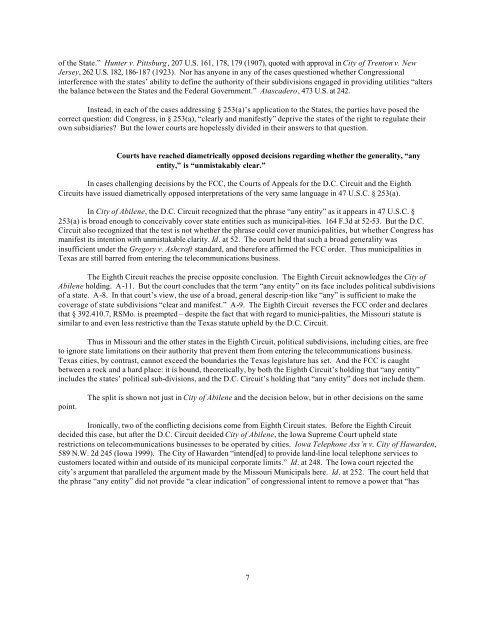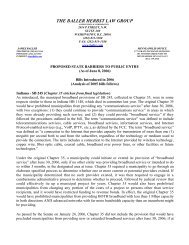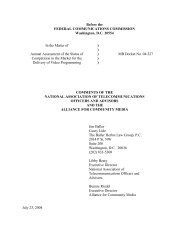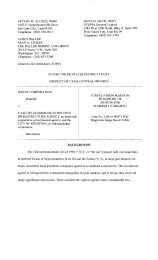Petition for Writ of Certiorari
Petition for Writ of Certiorari
Petition for Writ of Certiorari
You also want an ePaper? Increase the reach of your titles
YUMPU automatically turns print PDFs into web optimized ePapers that Google loves.
<strong>of</strong> the State.” Hunter v. Pittsburg, 207 U.S. 161, 178, 179 (1907), quoted with approval in City <strong>of</strong> Trenton v. New<br />
Jersey, 262 U.S. 182, 186-187 (1923). Nor has anyone in any <strong>of</strong> the cases questioned whether Congressional<br />
interference with the states’ ability to define the authority <strong>of</strong> their subdivisions engaged in providing utilities “alters<br />
the balance between the States and the Federal Government.” Atascadero, 473 U.S. at 242.<br />
Instead, in each <strong>of</strong> the cases addressing § 253(a)’s application to the States, the parties have posed the<br />
correct question: did Congress, in § 253(a), “clearly and manifestly” deprive the states <strong>of</strong> the right to regulate their<br />
own subsidiaries? But the lower courts are hopelessly divided in their answers to that question.<br />
Courts have reached diametrically opposed decisions regarding whether the generality, “any<br />
entity,” is “unmistakably clear.”<br />
In cases challenging decisions by the FCC, the Courts <strong>of</strong> Appeals <strong>for</strong> the D.C. Circuit and the Eighth<br />
Circuits have issued diametrically opposed interpretations <strong>of</strong> the very same language in 47 U.S.C. § 253(a).<br />
In City <strong>of</strong> Abilene, the D.C. Circuit recognized that the phrase “any entity” as it appears in 47 U.S.C. §<br />
253(a) is broad enough to conceivably cover state entities such as municipal-ities. 164 F.3d at 52-53. But the D.C.<br />
Circuit also recognized that the test is not whether the phrase could cover munici-palities, but whether Congress has<br />
manifest its intention with unmistakable clarity. Id. at 52. The court held that such a broad generality was<br />
insufficient under the Gregory v. Ashcr<strong>of</strong>t standard, and there<strong>for</strong>e affirmed the FCC order. Thus municipalities in<br />
Texas are still barred from entering the telecommunications business.<br />
The Eighth Circuit reaches the precise opposite conclusion. The Eighth Circuit acknowledges the City <strong>of</strong><br />
Abilene holding. A-11. But the court concludes that the term “any entity” on its face includes political subdivisions<br />
<strong>of</strong> a state. A-8. In that court’s view, the use <strong>of</strong> a broad, general descrip-tion like “any” is sufficient to make the<br />
coverage <strong>of</strong> state subdivisions “clear and manifest.” A-9. The Eighth Circuit reverses the FCC order and declares<br />
that § 392.410.7, RSMo. is preempted – despite the fact that with regard to munici-palities, the Missouri statute is<br />
similar to and even less restrictive than the Texas statute upheld by the D.C. Circuit.<br />
Thus in Missouri and the other states in the Eighth Circuit, political subdivisions, including cities, are free<br />
to ignore state limitations on their authority that prevent them from entering the telecommunications business.<br />
Texas cities, by contrast, cannot exceed the boundaries the Texas legislature has set. And the FCC is caught<br />
between a rock and a hard place: it is bound, theoretically, by both the Eighth Circuit’s holding that “any entity”<br />
includes the states’ political sub-divisions, and the D.C. Circuit’s holding that “any entity” does not include them.<br />
point.<br />
The split is shown not just in City <strong>of</strong> Abilene and the decision below, but in other decisions on the same<br />
Ironically, two <strong>of</strong> the conflicting decisions come from Eighth Circuit states. Be<strong>for</strong>e the Eighth Circuit<br />
decided this case, but after the D.C. Circuit decided City <strong>of</strong> Abilene, the Iowa Supreme Court upheld state<br />
restrictions on telecom-munications businesses to be operated by cities. Iowa Telephone Ass’n v. City <strong>of</strong> Hawarden,<br />
589 N.W. 2d 245 (Iowa 1999). The City <strong>of</strong> Hawarden “intend[ed] to provide land-line local telephone services to<br />
customers located within and outside <strong>of</strong> its municipal corporate limits.” Id. at 248. The Iowa court rejected the<br />
city’s argument that paralleled the argument made by the Missouri Municipals here. Id. at 252. The court held that<br />
the phrase “any entity” did not provide “a clear indication” <strong>of</strong> congressional intent to remove a power that “has<br />
7






